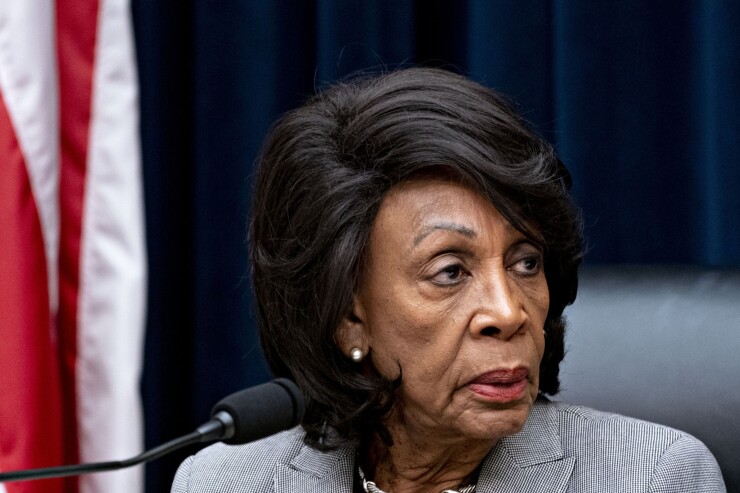Want unlimited access to top ideas and insights?
Congress is considering authorizing the Federal Reserve to purchase municipal bonds as one of the ways to support local and state efforts to address the coronavirus pandemic.
A memo circulated Wednesday by House Financial Service Committee Chairwoman Maxine Waters, D-Calif., suggests that the next wave of federal legislation authorize the Fed to support state, territory, and local debt issuance in response to the coronavirus outbreak.
The

President Trump on Wednesday signed the second emergency bill to address the coronavirus following its passage by the Senate earlier in the day. The second bill includes expanded eligibility for unemplyment benefits and paid sick leave.
The initial $8.3 billion bill signed into law March 6 included more than $3 billion for research and development of vaccines, therapeutics and diagnostics as well as $2.2 billion in public health funding for the response effort.
As the scope of the emergency has become clearer, the Trump adminsitration is considering spending $1 trillion on a broader response.
Americans for Financial Reform, a coalition of organized labor and liberal advocacy groups, has recommended that Congress mandate the Fed to purchase municipal debt to help state and local efforts to fight the epidemic and related economic fallout.
Marcus Stanley, policy director at Americans for Financial Reform, wrote in an op-ed for Bloomberg, pointing out that the Fed has used its authority in the past to help banks and even foreign governments.
“If the Fed provided this low-cost financing, it would instantly give hundreds of different governments across the country the financial ability to put their epidemic-fighting efforts into high gear, funding everything from new medical facilities, protective gear for health-care workers, measures to ensure continuation of key public services and support for social distancing,” Stanley wrote.
Current law largely precludes the Fed from purchasing munis, imposing a six-month maturity limit on debt not directly guaranteed by the federal government.
In the past the Fed has resisted the idea of playing a more direct role in supporting state and local finance. Then-Fed Chairman Ben Bernanke said in a 2008 letter to then-Rep. Paul Kanjorski, D-Pa.,that the Fed did not want new authority to lend to states and localities because such decisions were inherently politicial and jeopardized the freedom of localities from federal financial oversight.
The U.S. Conference of Mayors is asking Congress for $250 billion to deal with effects of the coronavirus including money for public health departments, revenue shortfalls by transit agencies, assistance for school districts and other needs.
The request involves additional funding for a number of existing federal grant programs ranging from Community Development Block Grants and Head Start to EPA State Revolving Fund Loan Programs for Clean Water and Drinking Water.
In the healthcare area, the request is for the U.S. Department of Health and Human Services through the CDC to provide Public Health Emergency Preparedness Grants as direct allocations to cities and for Community Services Block Grants (CSBG).
Through the U.S. Department of Housing and Urban Development, the request includes additional funding for Continuum of Care, Section 8, Public Housing, HOPWA, and Emergency Shelter Grant (ESG) programs.
Some of the requested assistance has already been addressed on the federal level and other parts have been proposed by members of Congress.
More than 380 counties so far have declared local public health disasters as they work to contain and mitigate the effects of the coronavirus.
The National Association of Counties has created an up-to-the-minute live map of counties around the nation that have declared a health disaster that’s posted on
“We’re fighting an invisible war, and we’re going to be fighting it for a while,” Stephen Acquario, executive director of the New York State Association of Counties, told NACo members earlier this week.
At the local level, the response to containing the coronavirus has differed by community in terms of mandating business closures.
The National Retail Federation sent a letter to President Trump and administration officials Thursday urging the federal government to produce national guidance for state and local governments seeking to clarify “essential retail businesses and services” for their communities.
“Several jurisdictions have overlooked the important role distribution centers and transportation logistic companies play in the retail industry,” the letter from retailers said. “Retailers, grocers and restaurants cannot resupply without access to their distribution centers.”
The letter also cited the need to keep open highway rest areas and the importance of a wide variety of retail stores including pharmacies, health care service retailers, convenience stores, pet stores and agricultural and farm retail stores that often are the only place to purchase livestock feed.





